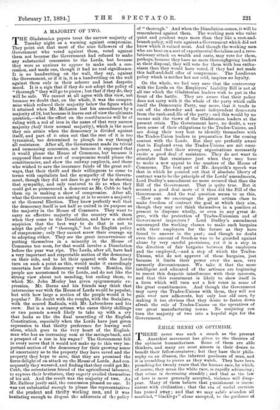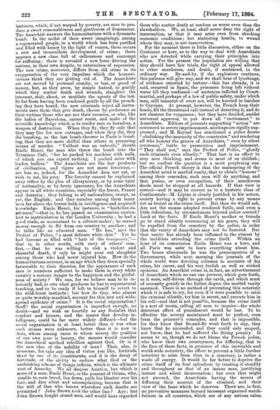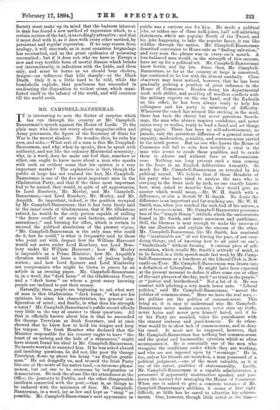RMILE HENRI ON OPTIMISM. T HERE never was such a smash
as the present Anarchist movement has given to the theories of the optimist humanitarians. Some of them are able thinkers, and many are most sincere in their desire to benefit their fellow-creatures; but they base their philo- sophy on an illusion, the inherent goodness of man, and it is crumbling to pieces as they watch. They have been preaching for twenty years that the human race, by which, of course, they mean the white race, is rapidly advancing ; that crime is decreasing steadily ; and that as the law of love is more generally accepted, violence will disap- pear. Many of them believe that punishment is incon- sistent with civilisation ; that the era of useful coercion has passed away ; and that we may safely abandon all mankind, "blacklegs" alone excepted, to the guidance of instincts, which, if not warped by poverty, are sure to pro- duce a sweet reasonableness and gentleness of demeanour. The Anarchist answers the humanitarians with a dynamite bomb. In the midst of their sweet imaginings, among a regenerated people, in a world which has been purified and filled with honey by the light of reason, there occurs a new and tremendous development of crime ; there appears a new class full of callousness and contempt for suffering ; there is revealed a new force driving the nations, in their own despite, to extremities of repression. The new crime, moreover, differs from old crime in its exaggeration of the very impulses which the humani- tarians think they are getting rid of. The Anarchists are not moved by personal enmity, or lust, or greed of money, but, as they avow, by simple hatred, to gratify which they scatter death and wounds, slaughter the innocent, stab, shoot, or mutilate the agents of the law. So far from having been rendered gentle by all the preach- ing they have heard, the new criminals reject all instru- ments save those that give death, choose by preference as their victims those who are not their enemies, or who, like the ladies of Barcelona, cannot resist, and make of the scientific knowledge which is to render men so harmless, a weapon of destruction. When they fly, they fly only that they may live for new outrages, and when they die, they die boasting, as the last bomb-thrower in Paris is boast- ing, that they are more skilful than others in preparing means of murder. "Valiant was an imbecile," shouts Emile Henri, the man who threw the bomb into the Terminus Cafe, "for he packed his machine with nails, of which you can expect nothing. I packed mine with leaden bullets." The Anarchists are the last products of civilisation, and tigers are not more ferocious,— are less so, indeed, for the Anarchist does not eat, or wish to eat, his prey. The ferocity cannot be explained away either by the plea of idiosyncrasy, or by some taint of nationality, or by brute ignorance, for the Anarchists appear in all white countries, especially the freest, France and America ; they belong to all nationalities, except, as yet, the English ; and they number among them many men far above the lowest both in intelligence and acquired knowledge. Emile Henri, for instance, is " baehelier-iis- sciences,"—that is, he has passed an examination equiva- lent to matriculation in the London University ; he had a good trade, as accountant to a cabinet-maker ; he earned money enough to flit from one country to another ; and he talks like an educated man. "He has," says the Prefect of Police, "a most delicate white skin." Yet he had become so filled with "hate of the bourgeoisie,"— that is, in other words, with envy of others' com- fort,.— that he was willing to risk a. violent and shameful death, if only he might pour out slaughter among those who had never injured him. How do the humanitarians account, in an age which they deem specially favourable to their theories, for the appearance of such men in numbers sufficient to make them in every white country a serious danger to the happiness and the pitiful- ness of society ? We can, for we believe man to be in- herently bad, to owe what goodness he has to supernatural teaching, and to be ready if left to himself to revert to the wild-beast instincts ; but how do they, who almost or quite worship mankind, account for this new and wide- spread epidemic of crime ? It is the social organisation ? Stuff ! the social organisation is imperfect enough, no doubt—and we wish as heartily as any Socialist that comfort and leisure, and the means that develop in- telligence, could be far more widely diffused—but the social organisation is at least better than it was when such crimes were unknown, better than it is now in Asia, where among races to whose misery the position of our own poor is luxury, the masses would consider the Anarchical method rebellion against God. Or is it the new idea of the nobility of man ? That, also, is nonsense, for take any idea of virtue you like, fortitude must be one of its constituents, and it is the decay of fortitude, of the ability to endure what God or the unthinking scheme of things inflicts, which is the ultimate root of .Anarchy. We all despise Asiatics, but which is more of a man, Emile Henri, or the peasant of Orissa, who, unable to earn bread, lies down, pulls his blanket over his face, and dies silent and uncomplaining, because that is the will of One who knows wherefore such deaths are permitted ? John Brown took the other line ? Aye ; but John Brown fought armed men, and would have regarded those who scatter death at random as worse even than the slaveholders. We, at least, shall never deny the right of insurrection, or that it may arise even from shocking economic conditions ; but scattering bombs, to wound whom they may, is not insurrection. For the moment there is little discussion, either on the Continent or here, as to the way to deal with Anarchists who are detected while carrying their principles into action. For the present the population are willing that they should have fair trials, the right of appeal allowed to other murderers, and death, if sentenced, in the ordinary way. By-and-by, if the explosions continue, this patience will give way, and we shall hear of lynchings, of evidence extorted by torture—this has already, it is said, occurred in Spain, the prisoners being left without water till they confessed—of sentences inflicted by Court- martial, and perhaps of a law of public safety, under which men, still innocent of overt act, will be hurried in batches to Cayenne. At present, however, the French keep their heads, fill the threatened café instead of deserting it, and do not clamour for vengeance ; but they have decided, amidst universal approval, to put down all " incitement " to Anarchism. Editors of journals supporting " action " are sentenced to severe imprisonment, meetings are rigidly sup- pressed ; and M. Raynal has sanctioned a police decree "abolishing the immunity of the cemeteries," and rendering all who honour the graves of Anarchists, "even by silent reverence," liable to prosecution and imprisonment. " They shall not," says the Prefect of Police, "glorify such criminals even silently." That last is an effort to stop men thinking, and seems to most of us childish ; but we confess the question is a most perplexing one. The official French theory is that the mainspring of the Anarchist mind is morbid vanity, that to obtain " honour " among their comrades, such men will do anything, and. that praise, or even recognition, of their murderous deeds must be stopped at all hazards. If that view is correct—and it may be correct as to a hysteric class of Continentals—M. Lepine is clearly justified in his action, society having a right to prevent crime by any means not as brutal as the crime itself. But then we would ask, Are not the means adopted rendered futile, and even a little ridiculous, by circumstances beyond police control ? Look at the facts. If Emile Henri's mother or friends go to stand silently reverencing at his grave, they will be expelled from the cemetery by the police, in order that the vanity of Anarchists may not be fostered. But that vanity has already been inflamed to the utmost by the incidents attending the crime itself. Within an hour of its commission Emile Henri was a hero, and all Paris was astir to learn everything about him. Two hours afterwards he was the preoccupation of a Government, while next morning the journals of the whole world were devoting columns to accounts of his crime, his career, and his very foolish as well as wicked. opinions. An Anarchist crime is, in fact, an advertisement of Anarchists which no one can prevent, which goes forth, as it were, self-driven through the earth, and which must of necessity gratify in the fullest degree the morbid vanity assumed. There is no method of preventing this notoriety which it is safe to try, for even if it were possible to seize the criminal silently, try him in secret, and execute him in his cell—and that is not possible, because the crime itself is a sort of tocsin, calling all men to inquire—the whole deterrent effect of punishment would be lost. To be effective the secrecy maintained must be perfect, even from the prisoner's comrades, and that is impossible, for they know that So-and-So went forth to slay, they know that he succeeded, and they could only suspect, not know, that he had suffered the fitting penalty. It seems to us, though we do not blame the French police, who know their own countrymen, for differing, that in the face of these facts, in presence of this inevitable and world-wide notoriety, the effort to prevent a little further notoriety to arise from rites in a cemetery, is rather a waste of energy. It would be far better to deprive the crime itself of its foul splendour by treating it steadily and throughout as that of an insane man, justifying instant and silent incarceration ; but even that might not succeed, the Anarchists having the means of diffusing their account of the criminal, and their view of the fame which he deserves. There are, in fact, no preventive measures beyond incessant organised watch- fulness in all countries, which are of any serious value. Society must make up its mind that the badness inherent in man has found a new method of expression which, to a certain section of the bad, is exceedingly attractive ; and that it must deal with it, as it does with every other method, by persistent and regular repression. If we may reason from analogy, it will succumb, as in most countries brigandage has succumbed, and as the great epidemics of poisoning succumbed ; but if it does not, why we have in Europe a new and very terrible form of mortal disease which breaks out intermittently, is infectious with the liable, and them only, and must be borne as we should bear cholera, dengue—an influenza that kills sharply—or the Black Death. Only it is a little hard to be told, while the bombshells explode, that gentleness has succeeded in eradicating the disposition to violent crime, which mani- fested itself in the infancy of the world, and will continue till the world cools.








































 Previous page
Previous page